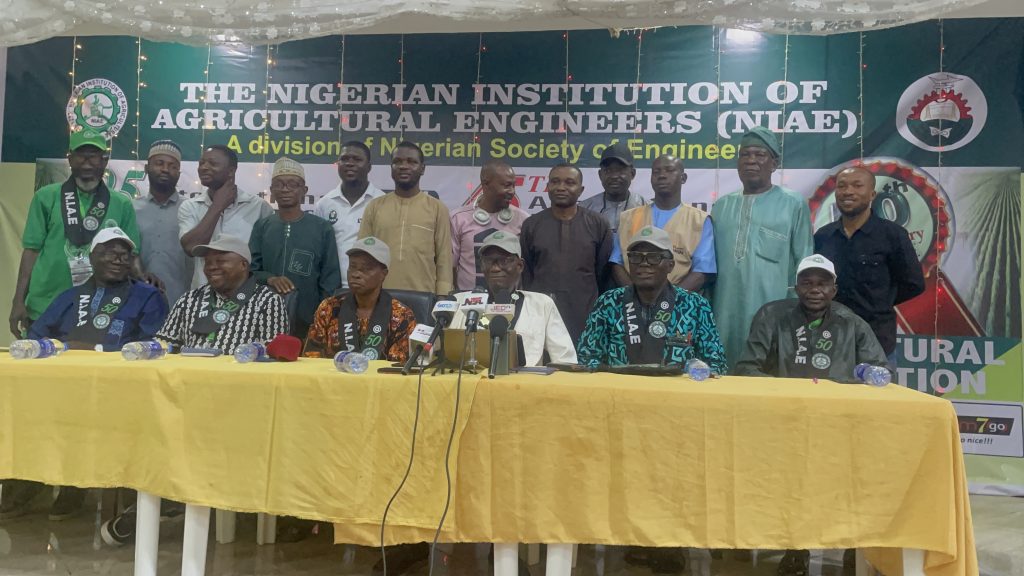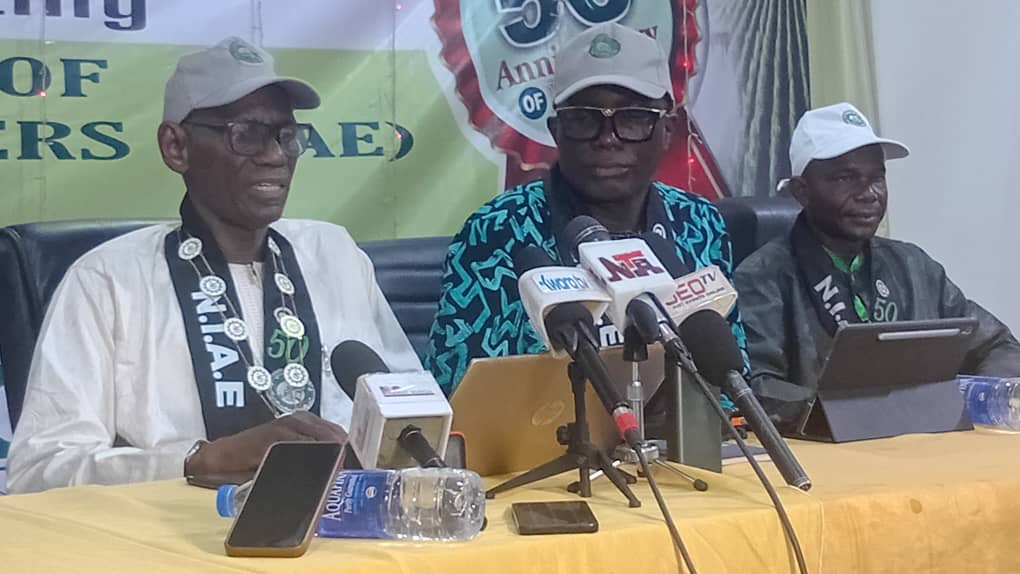The Nigerian Institution of Agricultural Engineers (NIAE) has called for the establishment of a unified national standardisation and regulation framework for agricultural machinery and emerging technologies, describing it as critical to Nigeria’s food security, industrial growth, and climate-resilient development.
This was part of the far-reaching resolutions at the Institution’s 25th International Conference, 45th Annual General Meeting, and 50th anniversary celebration held in Ilorin, Kwara State, between November 10 and 14, 2025.
The annual gathering, themed “Standardization and Promotion of Proven Technologies for Agricultural Production and Value Addition in Nigeria,” brought together engineers, policymakers, academics, private-sector leaders, farmers, and international development stakeholders.
The conference also hosted the maiden National Agricultural Machinery Exhibition (NAME), a major showcase of indigenous technologies designed to reduce Nigeria’s reliance on imported equipment and improve farmers’ access to appropriate mechanisation tools.
While presenting the communique, the National Chairman of the Institution, Engr. Prof. J.O. Olaoye, said that, the conference focused on the need to strengthen agricultural engineering standards, improve coordination among institutions, enhance mechanisation, and expand the application of climate-smart and digital technologies in agricultural production and value addition.
Delegates emphasised that Nigeria’s food security depends significantly on the effective deployment, regulation, and commercialisation of homegrown innovations.
The Institution called on the Federal Ministry of Agriculture and Food Security to lead the development of a unified national standardisation framework for agricultural technologies in collaboration with the Agricultural Research Council of Nigeria (ARCN), the Standards Organisation of Nigeria (SON), the National Centre for Agricultural Mechanization (NCAM), and other relevant agencies.
The framework, the communique noted, should categorise agricultural machines, specify operational standards, guarantee safety, and ensure uniformity of use across the country. “Improved standardisation would enhance the credibility, quality, and acceptance of indigenous technologies”.
The communique stated the urgent need to scale up technologies that have been tested and proven effective for Nigerian farming systems.
The Institution urged government at all levels to support the dissemination of innovative tools capable of increasing productivity and reducing post-harvest losses.
It added that the widespread adoption of such technologies would boost rural livelihoods and strengthen national food production.
According to the communique, delegates called for sustained cooperation among agricultural engineering research institutions, regulatory bodies, fabricators, universities, and private-sector partners.
The communique added, synergy among these stakeholders is essential for research validation, technology standardisation, field trials, farmer sensitisation, and mass adoption of locally developed machines.
NIAE, however, recommended that universities and polytechnics review and upgrade their agricultural engineering curricula to align with global advancements.
The communique stressed the need to integrate emerging fields such as digital agriculture, automation, precision engineering, standards development, coding, and renewable energy systems into training programmes.
It further called for structured capacity-building programmes, professional mentoring, and exposure of students to real-life engineering challenges.
Delegates noted that inadequate research funding remains a major constraint to the development and commercialisation of agricultural technologies.

The Institution urged federal and state governments, development partners, and the private sector to increase investments in agricultural engineering research, prototype development, laboratory facilities, and pilot projects.
The communique emphasised the importance of providing technical and financial support to local fabricators to enhance the quality and competitiveness of their machines.
NIAE also recommended targeted funding, training, and access to fabrication equipment to enable innovators to meet approved standards and supply affordable technologies to farmers.
Delegates advocated the adoption of climate-smart agricultural technologies that address environmental challenges and promote sustainable production systems.
The communique also recognised the contributions of women professionals in agricultural engineering and encouraged greater gender inclusion in training, research, and field-level mechanisation initiatives.
The Institution reiterated the need to increase mechanisation coverage across Nigeria, particularly for smallholder farmers.
It then, called for the establishment of community-based mechanisation centres, improved access to post-harvest and processing technologies, and stronger value-addition systems to reduce losses and improve food quality.
Delegates urged the creation of market linkages that would connect researchers, fabricators, financial institutions, and end users.
The communique stressed that without structured commercialisation pathways, innovative technologies would continue to underperform despite their potential to transform the agricultural sector.
In its final resolutions, NIAE reaffirmed its commitment to supporting national food security goals through engineering innovations, policy advocacy, research development, and partnerships.
The Institution pledged to continue advancing technologies that improve productivity, enhance efficiency, and contribute to Nigeria’s economic growth.
It will be recalled that the Kwara State Governor Mallam AbdulRahman AbdulRazaq, while declaring the conference open, reiterated the state’s commitment to strengthening agricultural innovation, mechanisation, and research partnerships.
He noted that Nigeria must invest aggressively in technology adaptation if it hopes to address rising food costs, climate-related disruptions, and post-harvest losses.
The Special Guest of Honour, Professor Babagana Umara Zulum, Governor of Borno State, delivered the keynote address. He emphasised the need to commercialise homegrown innovations, stressing that Nigeria’s food security challenges require “practical solutions beyond academic presentations.”
Zulum inspired the introduction of NAME and urged engineers to demonstrate technologies that can be mass-produced and deployed across rural communities.
During technical sessions, presentations were made by experts from the Agricultural Research Council of Nigeria (ARCN), Standards Organisation of Nigeria (SON), National Centre for Agricultural Mechanization (NCAM), NIJI Group, and Women in Agricultural & Biosystems Engineering Network (WABEN).
Discussions centred on the urgent need to regulate agricultural machines, promote digital agriculture, and support local fabricators through clear standards and predictable market frameworks.
Engineering scholars also emphasised the importance of aligning training programmes with global trends, including automation, robotics, renewable energy applications, precision agriculture, artificial intelligence, and environmental sustainability.
